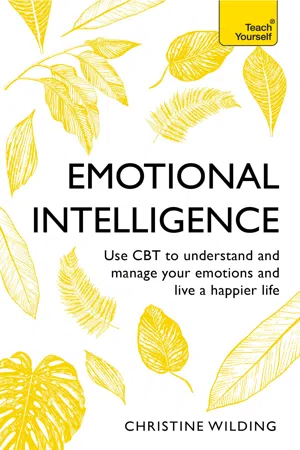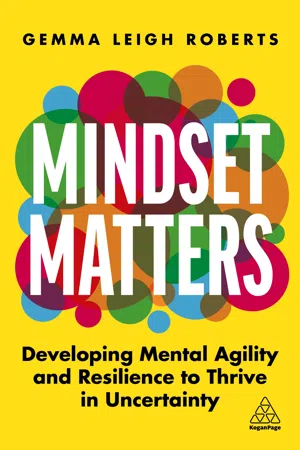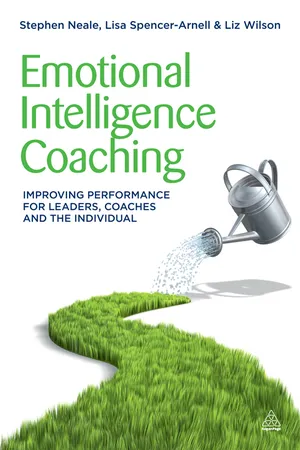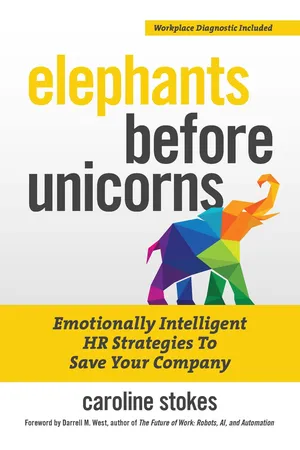Emotional Intelligence
Emotional intelligence refers to the ability to recognize, understand, and manage one's own emotions, as well as to perceive and influence the emotions of others. In a business setting, emotional intelligence is crucial for effective leadership, communication, and decision-making. It enables individuals to navigate complex social dynamics, build strong relationships, and foster a positive work environment.
7 Key excerpts on "Emotional Intelligence"
- eBook - ePub
Manage to Lead
Flexing Your Leadership Style
- Cynthia Stackpole Snyder(Author)
- 2012(Publication Date)
- Project Management Institute(Publisher)
...It is their self-awareness and management, and their social awareness and skills. Emotional Intelligence sets apart which executives, professionals, or scientists will be the best leaders. ii Your ability to have good relationships with others gets you farther in business and in your personal life than your IQ. It's not how smart you are that counts, but rather how you are smart. 1 Emotional Intelligence is the critical distinction between great leaders and people that have risen in the hierarchy based on their position. According to Daniel Goleman, a person can have the best training in the world, an incisive, analytical mind, and an endless supply of smart ideas, but he still won't make a great leader. iii In the Johnson and Johnson Company they did a study and found that in divisions around the world, those identified at mid-career as having high leadership potential were far stronger in EI competencies than were their less-promising peers. In fact, the higher a person rises in an organization, the more important Emotional Intelligence becomes. In senior leadership positions, nearly 90% of the difference in successful leaders is attributable to Emotional Intelligence factors rather than cognitive ones. iv Topic 2: A Little More on Self-Awareness The first component of EI is self-awareness. Though we covered self-awareness in the previous chapter, since it is the first component of Emotional Intelligence I want to say a few more words about it in the context of EI. Recognize your moods and emotions Conduct realistic self-assessment Possess Self-confidence The aspects of self-awareness that are most prevalent when discussing Emotional Intelligence are recognizing and understanding your moods and emotions and how they impact you, your job performance and your team members...
- eBook - ePub
- Christine Wilding(Author)
- 2017(Publication Date)
- Teach Yourself(Publisher)
...Developing EI will equip you to make choices and influence outcomes in all the areas of your life in which you choose to use this skill. Put simply, EI is an ability to get along with both yourself and others. This can be explained in graphic form: Figure 1.1 Source : Adapted from David Caruso and Peter Salovey, The Emotionally Intelligent Manager, 2004 The following will help you to understand these ideas a little more: IDENTIFYING EMOTIONS The idea is that emotions contain data, signalling to us about important events going on in our world. We need to accurately identify these emotions in both ourselves and others in order to convey and express ourselves and to communicate effectively. USING EMOTIONS How we feel influences how we think – and what we think about. Feelings direct our attention to important events; they make sure we are ready to take action when required and they enable us to use our thoughts appropriately to problem solve. UNDERSTANDING EMOTIONS Emotions are not random events; they have underlying causes. Once we become familiar with these, we can use our emotions to more easily understand what is going on – or is about to go on – around us. MANAGING EMOTIONS Because emotions contain information and influence thinking, we need to incorporate them intelligently into our reasoning and problem-solving. This requires us to stay open to emotions, whether they are welcome or not, and to choose strategies that include the wisdom of our feelings. Remember this Recent research from the University of California (Professor Susan Charles et al. in the journal Psychological Science) suggests that maintaining a good emotional balance is crucial to avoiding severe mental health issues in later years. The findings show that negative reactions to the most minor emotional experiences on a day-to-day basis can take a toll on long-term psychological well-being...
- eBook - ePub
Soft Skills
Personality Development For Life Success
- Prashant Sharma(Author)
- 2020(Publication Date)
- BPB Publications(Publisher)
...CHAPTER 2 Emotional Intelligence LEARNING MILESTONES This Chapter will enable you to: ➢ Understand What is Emotional Intelligence? ➢ Learn how EI helps us at home and at work. ➢ Develop an understanding of the relation between IQ and EQ. ➢ Know how Self-awareness and Self-Management can be powerful personal transformation tools. ➢ Find out how Social skills and empathy can be strong motivational tools. ➢ Master the art of becoming an Emotionally Intelligent. ➢ Acquire new Business phrases and Build your vocabulary. All feelings are like tools in your hand, to create a monument called Life It isn’t the mountain ahead that tires you - it’s the small stone inside your shoe.”-Robert Service Winners don’t have the best of everything…They make the best of everything – Anthony Robbins 2.1 Essentials of Emotional Intelligence Emotional Intelligence (EI) is a type of social intelligence and the ability of individuals to control their own emotions and use this to recognize and guide others emotions and actions. EI is a collection of emotions, skills and characteristics that drive performance and success. EI simply means to use emotions intelligently according to your advantage. The knowledge of EI is extremely essential as it is now clear that technical skills alone cannot provide professional and personal success. High EI is a great predictor of high-performance. There is a direct link between EI and earning potential. People with high EI make more money on an average than others. Research done by Harvard University and The Carnegie Foundation showed that 85% of success comes from Soft Skills...
- eBook - ePub
Project Management Leadership
Building Creative Teams
- Rory Burke, Steve Barron(Authors)
- 2014(Publication Date)
- Wiley(Publisher)
...Chapter 9 Emotional Intelligence Learning Outcomes After reading this chapter you should be able to: Recognize that emotions can affect our behavior and actions, becoming significant drivers of performance and achievement. Identify the Emotional Intelligence domains and competencies appropriate to leadership and team working. Emotional Intelligence can be defined as: The development of social skills and intelligence regarding the emotions, especially in the ability to monitor one’s own or others’ emotions. Emotional Intelligence (EI) has been brought into the popular and management arenas through the work and writing of Daniel Goleman. He asserts that when working in teams or closely with other people, our emotions play a significant part in shaping our behaviors and the quality of our relationships. This adds a new dimension to the skills that are necessary for successful collaboration; skills that are not usually taught in schools or colleges. It is these skills that relate to how we deal with people at a personal level. Emotional Intelligence allows the identification of appropriate emotions and how they can identify and support appropriate action. Also, particular intelligence ‘domains’ can contribute to effective leadership styles (see Chapter 6 on Leadership Theories and Styles). The concepts behind Emotional Intelligence are based upon many years of research, conducted internationally with a wide range of contributions across many walks of life. For those who are new to ideas of Emotional Intelligence, this chapter will provide an introduction to its ideas and application for leaders...
- eBook - ePub
Mindset Matters
Developing Mental Agility and Resilience to Thrive in Uncertainty
- Gemma Leigh Roberts(Author)
- 2022(Publication Date)
- Kogan Page(Publisher)
...CHAPTER 08 Emotional Intelligence When it comes to dealing with uncertainty and finding a way to thrive when the world is complicated and uncertain, it’s essential to build Emotional Intelligence. Unlike the measure of general intelligence – the intelligence quotient (or IQ) – which is fairly fixed and stable over time, Emotional Intelligence can change and be developed. Although the idea of Emotional Intelligence can seem complicated, at its root are simple concepts: understanding and expressing emotions and being empathetic when communicating with others. Emotional Intelligence at work has been a hot topic for the past decade, and today it’s still an issue that executives, leaders and employees want to understand better to achieve results. My LinkedIn Learning course on the topic has been taken by over one million learners, and regularly makes the top course lists. 1 It seems that people are eager to learn more about the concept of Emotional Intelligence and understand how to apply the skills to their working lives. How did Emotional Intelligence become such a hot topic at work? In part, this is because the impact of Emotional Intelligence is backed by research, which tells us it can support collaboration across teams and promote innovation. 2 High levels of Emotional Intelligence have also been linked to lower levels of stress and better psychological and physical health. Those who have higher levels of Emotional Intelligence display better decision-making skills when under pressure, and higher levels of performance when compared with those who have lower levels of Emotional Intelligence. The rise of the focus on Emotional Intelligence at work is also in part because the concept is accessible and easy to apply – in our busy working lives we want simple and effective tools that can help us to thrive at work...
- eBook - ePub
Emotional Intelligence Coaching
Improving Performance for Leaders, Coaches and the Individual
- Stephen Neale, Lisa Spencer-Arnell, Liz Wilson(Authors)
- 2011(Publication Date)
- Kogan Page(Publisher)
...As Henry Ford once stated: ‘Whether you think you can, or think you can’t… you’re right.’ Emotional Intelligence – two aspects To be successful requires effective awareness, control and management of your own emotions, and awareness and understanding of other people. EI therefore embraces two aspects of intelligence: 1) understanding yourself, your goals, intentions, responses, behaviour and all; 2) understanding others and their feelings. In his 1980’s research into multiple intelligences, Howard Gardner describes these two aspects of intelligence as intrapersonal intelligence – being intelligent in picking up what is going on inside us and doing what we need to do about it; and interpersonal intelligence – being intelligent in picking up what is going on in other people and between other people and doing what we need to do about it. Figure 1.3 shows how these two types of intelligence are connected to Emotional Intelligence. FIGURE 1.3 How intrapersonal and interpersonal intelligence are connected to Emotional Intelligence We will define what each of these different aspects of EI mean later in this chapter. Here is a case study demonstrating how a lack of self-management and relationship management can show itself in the workplace. CASE STUDY Barry and Mark Barry was a successful sales manager working for a pharmaceutical company. His results over the last six months had been particularly impressive, so his boss decided to reward him. He called Barry into his office and told him he was so pleased with Barry’s performance that the company would pay for a two-week Caribbean cruise for Barry and his family. Naturally, Barry was very pleased and wanted to share his happiness with his colleagues. The first person he saw was Mark, a colleague also working as a sales manager in the same department. When he told Mark, he was surprised by Mark’s reaction. Even though Mark said he was pleased for him, Barry got the impression that Mark was in some way disappointed...
- eBook - ePub
Elephants Before Unicorns
Emotionally Intelligent HR Strategies to Save Your Company
- Caroline Stokes(Author)
- 2019(Publication Date)
- Entrepreneur Press(Publisher)
...As a result, her stress management capabilities increase, she becomes more productive at work, and she is better able to work with others and accomplish key goals. Consider this book my coaching session with you. In this chapter, you will learn about the five categories of Emotional Intelligence. As we examine different elephants in the workplace later in the book, you’ll see which EQ categories become stressed in different scenarios—and you’ll learn how to bring awareness to each situation so you can navigate the best path forward. The Five Components of Emotional Intelligence Emotional Intelligence, as measured in the Emotional Quotient Inventory (EQ-i 2.0) is composed of five categories, each with three subcategories as shown in the following sidebar. MHS EMOTIONAL QUOTIENT INVENTORY (EQ-I 2.0) 1. Self-Perception ▶ Self-Regard: Respecting oneself; having confidence ▶ Self-Actualization: The pursuit of meaning, self-improvement ▶ Emotional Self-Awareness: Understanding one’s own emotions 2. Self-Expression ▶ Emotional Expression: Being able to constructively express emotions ▶ Assertiveness: Communicating feelings and beliefs in a nonoffensive manner ▶ Independence: Being self-directed, free from emotional dependency 3. Interpersonal ▶ Interpersonal Relationships: Able to maintain mutually satisfying relationships ▶ Empathy: Quality of being understanding, appreciative of how others feel ▶ Social Responsibility: Developing a social conscience, helping the larger community 4. Decision Making ▶ Problem Solving: Ability. to find solutions when emotions are involved ▶ Reality Testing: Ability to be objective; see things as they really are ▶ Impulse Control: Ability to resist or delay the impulse to act 5. Stress Management ▶ Flexibility: Adapting emotions, thoughts, and behaviors ▶ Stress Tolerance: Coping with stressful situations ▶ Optimism: Maintaining a positive attitude and outlook on life Copyright ©2011, Multi-Health Systems Inc. All Rights Reserved...






